2013版初中英语全程复习方略课件(教材复习案)七年级下册 Units 1-4(冀教版)(共72张PPT)
文档属性
| 名称 | 2013版初中英语全程复习方略课件(教材复习案)七年级下册 Units 1-4(冀教版)(共72张PPT) | 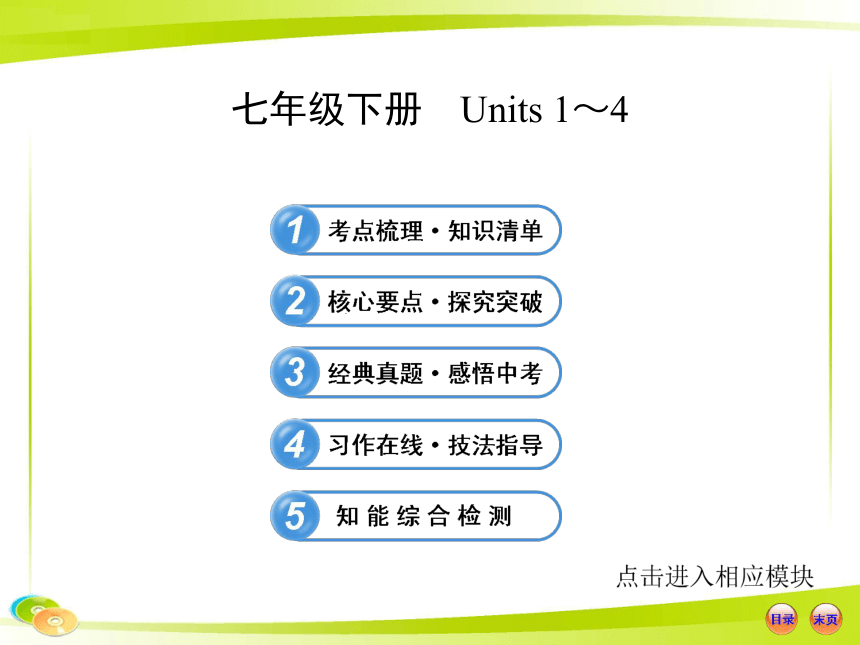 | |
| 格式 | zip | ||
| 文件大小 | 1.0MB | ||
| 资源类型 | 教案 | ||
| 版本资源 | 冀教版 | ||
| 科目 | 英语 | ||
| 更新时间 | 2014-03-01 23:09:02 | ||
图片预览

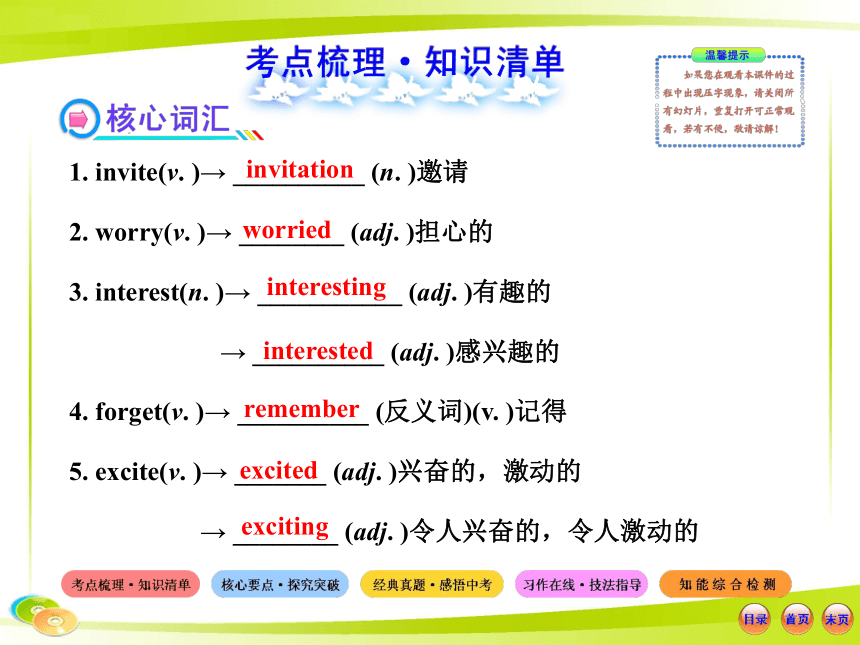
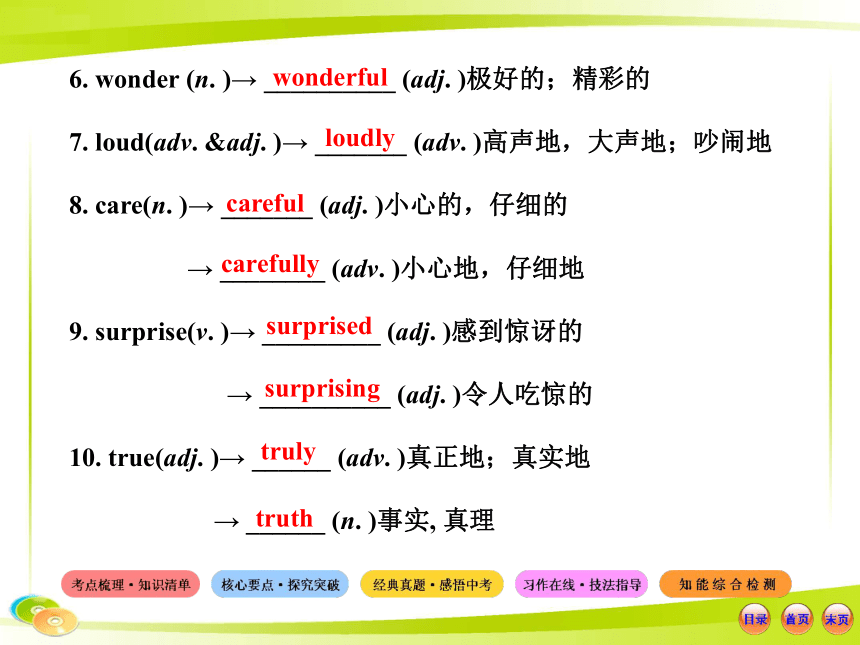
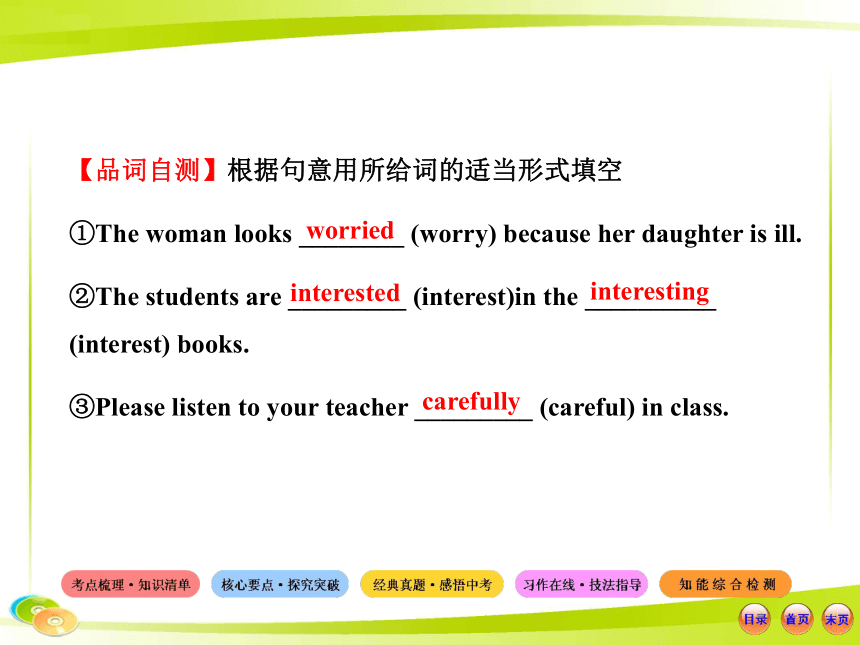
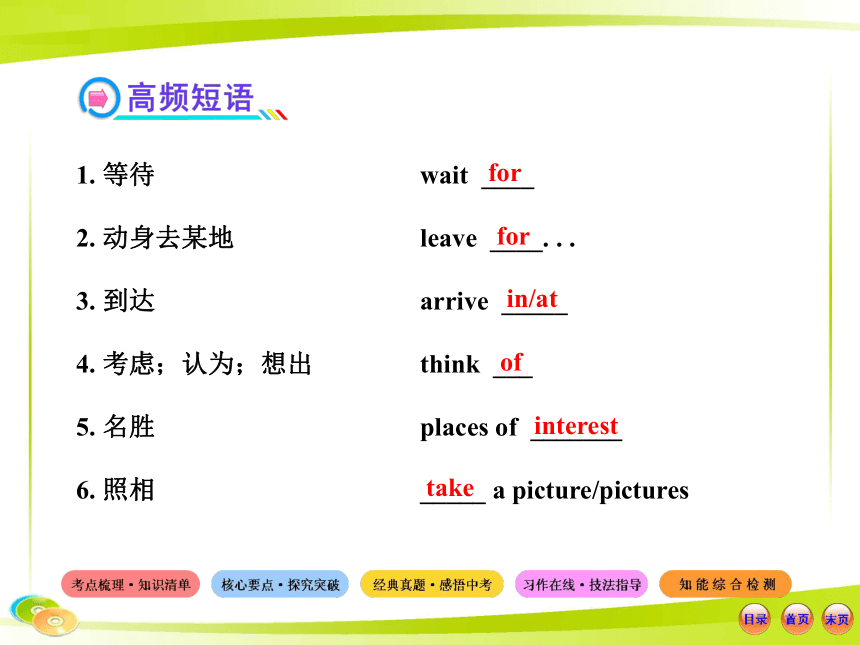
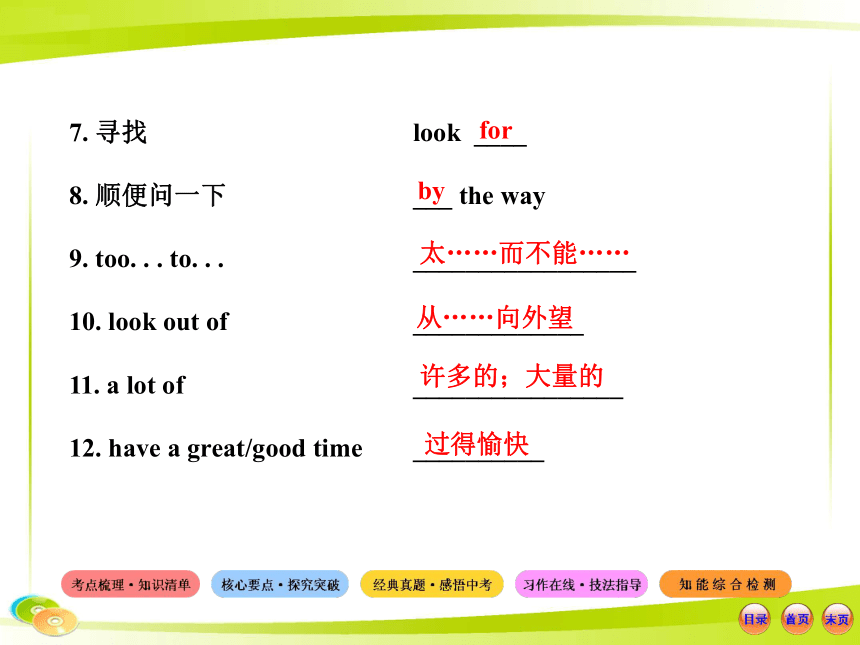
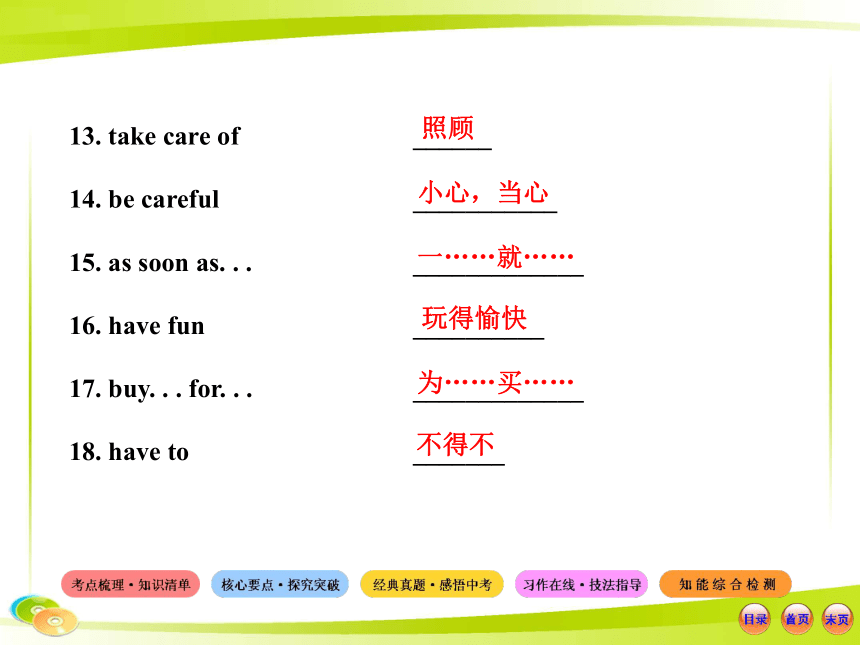
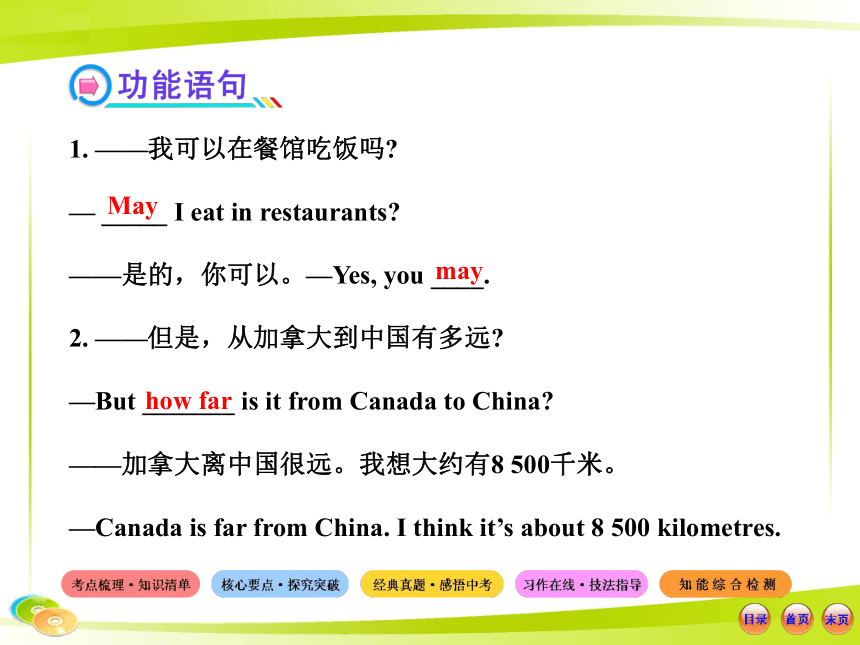
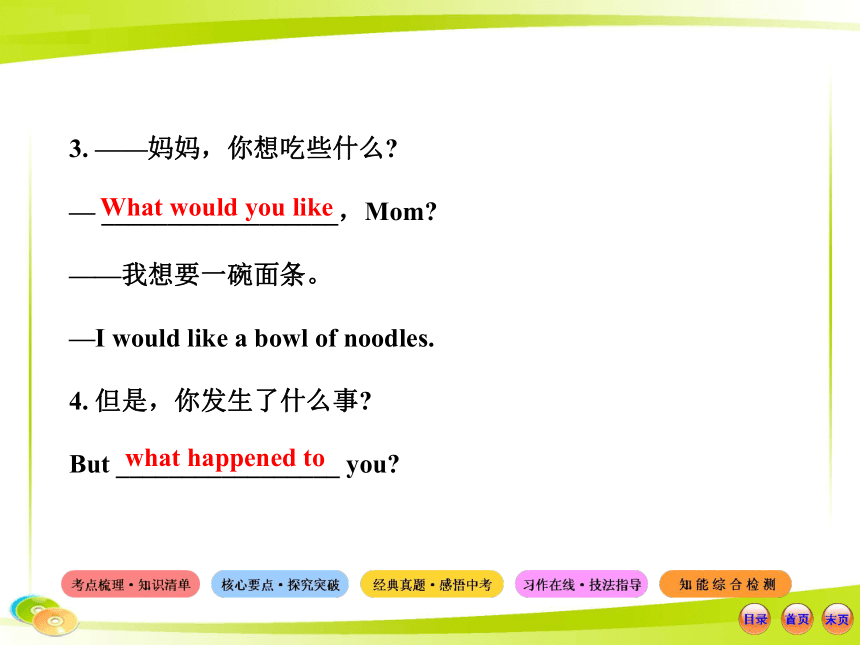
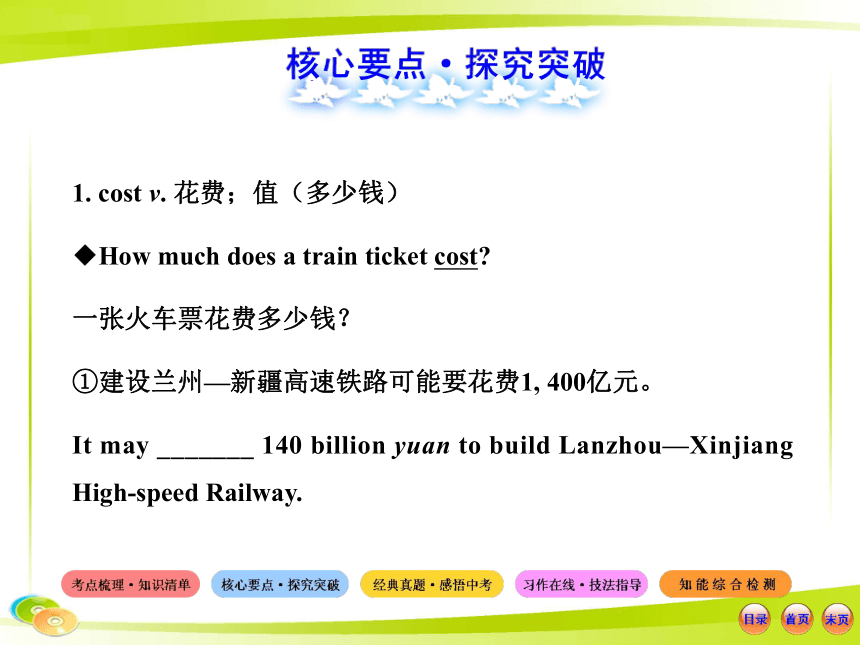
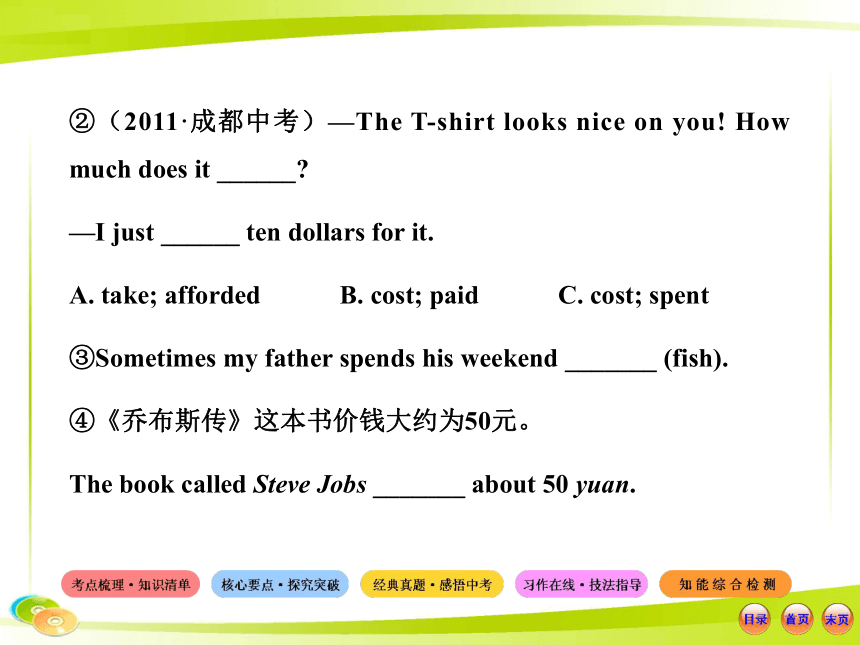
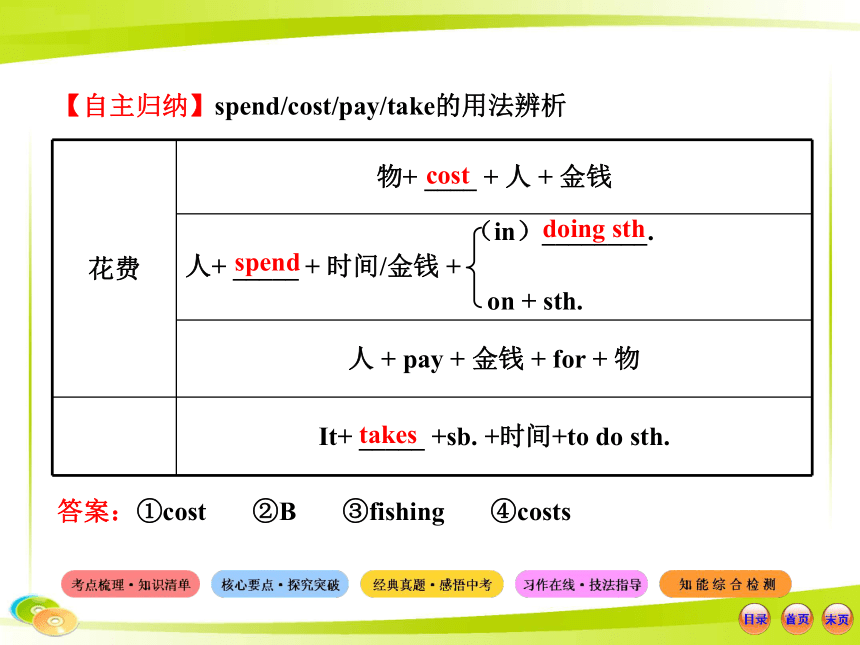
文档简介
课件72张PPT。七年级下册 Units 1~41. invite(v. )→ __________ (n. )邀请
2. worry(v. )→ ________ (adj. )担心的
3. interest(n. )→ ___________ (adj. )有趣的
→ __________ (adj. )感兴趣的
4. forget(v. )→ __________ (反义词)(v. )记得
5. excite(v. )→ _______ (adj. )兴奋的,激动的
→ ________ (adj. )令人兴奋的,令人激动的invitationworriedinterestinginterestedrememberexcitedexciting6. wonder (n. )→ __________ (adj. )极好的;精彩的
7. loud(adv. &adj. )→ _______ (adv. )高声地,大声地;吵闹地
8. care(n. )→ _______ (adj. )小心的,仔细的
→ ________ (adv. )小心地,仔细地
9. surprise(v. )→ _________ (adj. )感到惊讶的
→ __________ (adj. )令人吃惊的
10. true(adj. )→ ______ (adv. )真正地;真实地
→ ______ (n. )事实, 真理wonderfulloudlycarefulcarefully surprisedsurprisingtrulytruth【品词自测】根据句意用所给词的适当形式填空
①The woman looks ________ (worry) because her daughter is ill.
②The students are _________ (interest)in the __________ (interest) books.
③Please listen to your teacher _________ (careful) in class. worriedinterestedinterestingcarefully1. 等待 wait ____
2. 动身去某地 leave ____. . .
3. 到达 arrive _____
4. 考虑;认为;想出 think ___
5. 名胜 places of _______
6. 照相 _____ a picture/picturesforforin/atofinteresttake7. 寻找 look ____
8. 顺便问一下 ___ the way
9. too. . . to. . . _________________
10. look out of _____________
11. a lot of ________________
12. have a great/good time __________forby太……而不能……从……向外望许多的;大量的过得愉快13. take care of ______
14. be careful ___________
15. as soon as. . . _____________
16. have fun __________
17. buy. . . for. . . _____________
18. have to _______照顾小心,当心一……就……玩得愉快为……买……不得不1. ——我可以在餐馆吃饭吗?
— _____ I eat in restaurants?
——是的,你可以。—Yes, you ____.
2. ——但是,从加拿大到中国有多远?
—But _______ is it from Canada to China?
——加拿大离中国很远。我想大约有8 500千米。
—Canada is far from China. I think it’s about 8 500 kilometres. Maymayhow far3. ——妈妈,你想吃些什么?
— __________________,Mom?
——我想要一碗面条。
—I would like a bowl of noodles.
4. 但是,你发生了什么事?
But _________________ you? What would you likewhat happened to1. cost v. 花费;值(多少钱)
◆How much does a train ticket cost?
一张火车票花费多少钱?
①建设兰州—新疆高速铁路可能要花费1, 400亿元。
It may _______ 140 billion yuan to build Lanzhou—Xinjiang High-speed Railway. ②(2011·成都中考)—The T-shirt looks nice on you! How much does it ______?
—I just ______ ten dollars for it.
A. take; afforded B. cost; paid C. cost; spent
③Sometimes my father spends his weekend _______ (fish).
④《乔布斯传》这本书价钱大约为50元。
The book called Steve Jobs _______ about 50 yuan. 【自主归纳】spend/cost/pay/take的用法辨析答案:①cost ②B ③fishing ④costscostdoing sthtakesspend2. interesting adj. 有趣的
◆I want them to know about the interesting places in Beijing.
我想让他们知道有关北京的有趣的地方。
①He told us an ______ story and we’re all ______ in it.
A. interested; interesting B. interesting; interested
C. interesting; interesting D. interested; interested②Many young people take great _______ in chatting online.
A. interest B. interests
C. interested D. interesting【自主归纳】 interesting/interested/interest的用法辨析
答案:①B ②Ainterestinginterested3. forget v. 忘记
◆Don’t forget your teddy bear. 别忘记你的泰迪熊。
①我忘记曾告诉过你这消息了。
I forgot _______ (tell) you the news. ②——你在北京时别忘了去看我的父母。
——好的!我不会忘的。
—Don’t forget _______ my parents when you are in Beijing.
—OK!I won’t.
③Have you seen a pen here? I _______ one here this morning.
A. forgot B. left
C. have forgotten D. have left【自主归纳】
(1)forget to do sth. 与forget doing sth. 的用法辨析to dodoing(2)forget与leave的用法辨析
答案:①telling ② to see ③Bforgetleave4. stop v. 停止;阻止
◆Stop! Don’t jump onto the train! 停!别跳上火车!
①—How did you make the baby stop _______?
—I played the videos of animals for him, and then he laughed.
A. cry B. to cry C. crying D. cried
②The doctor told Mr Lin to stop smoking. (改为同义句)
The doctor told Mr Lin to ______ ______ smoking. 【自主归纳】 stop的用法
(1)stop作动词常用于下面搭配中:
①stop _____ sth. 意为“停止做某事”,其中动名词作宾语。
②stop to do sth. 意为“停下来去做另外一件事”,其中不定式在句中作目的状语,即停下来的目的是去做另外一件事。
③stop sb. (from)doing sth. 意为“阻止某人做某事”,相当于prevent sb. (from) doing sth. 或者keep sb. from doing sth. (其中与keep搭配的介词from不能省略)。
(2)stop还可以作名词,意为“车站”。doing【一言巧辨异】 When my father tells me to stop watching TV, I usually stop to read. But the books can’t stop me from thinking about the game shows I’m interested in.
当爸爸告诉我停止看电视时,我一般会停下来去看书。但是那些书并不能阻止我去想我感兴趣的那些运动节目。
答案:①C ②give up 5. enjoy v. 喜欢;享受……乐趣
◆I hope you will enjoy your trip.
我希望你能喜欢你的旅行。
①Did you enjoy _______ (you) during the summer holiday, boys and girls?
②Many children enjoy _______ cartoons a lot.
A. watch B. to watch
C. watching D. watched 【自主归纳】 enjoy的用法
(1)enjoy sth. 意为“喜爱……”;
(2)enjoy ______ sth. 意为“喜爱做某事”;
(3)enjoy oneself意为“玩得高兴,过得愉快”, 相当于have a good/nice/wonderful time。
答案:①yourselves ②Cdoing6. must v. aux. 必须;应当
◆There must be hundreds of people here.
这儿一定有数以百计的人。
①你绝不能那样说话。
You _______ talk like that. ②Your coat is so beautiful. It ______ be expensive.
A. may B. must C. can D. need
③(2011·内江中考)—Must I be home before eight o’clock, Mum?
—No, you _______. But you have to come back before ten o’clock.
A. needn’t B. can’t C. mustn’t【自主归纳】情态动词must用法
(1)must表示必要、命令或强制, 意为“必须”;其否定形式mustn’t意为“绝不,禁止”。
(2)以must开头的一般疑问句,其肯定回答可以用must;而否定回答中要用needn’t或don’t have to而不用mustn’t。
(3)must表示肯定的推测,意为“一定是”,而其对应的否定推测为can’t ,意为“不可能”。
答案:①mustn’t ②B ③A7. instead adv. 代替;更换
◆I was trying to find Taihe Hall, but I found a pillar instead.
我正在尽力找太和宫,但却找到了一个柱子。
①Alice didn’t watch TV last night. She went shopping ______.
A. instead B. either C. too D. also
②What bad weather! Let’s watch TV _______ going fishing.
A. thanks to B. instead of
C. together with D. interested in【自主归纳】 instead 与instead of的区别
(1)_______ 用作副词,意为“代替;顶替”,常用于句末。
(2)instead of用作介词短语,意为“代替,而不是”,其后跟动词时,需用v. -ing形式。
答案:①A ②Binstead8. have to 不得不
◆You have to move. 你不得不动。
①Cindy got up late this morning, so she _______ _______ (不得不) take a taxi to school.
②You needn’t clean the window—I did it yesterday.
A. mustn’t B. can’t
C. don’t have to D. aren’t have to 【自主归纳】 have to/must的用法辨析
答案:①had to ②Cneedn’t9. look for寻找
◆Maybe she is looking for her mother.
也许她正在寻找她的妈妈。①My little dog is lost. All of my friends are helping me to _______ it.
A. look at B. look for
C. look after D. look like
②—Can I help you?
—Could you please ______ ______ (查明) when the next flight to London takes off? 【自主归纳】 look for/look up/find/find out的用法辨析
答案:①B ②find outlook for10. have fun玩得开心
◆They are having fun. 他们正玩得开心。
①Last weekend, the Greens had great fun ______ at Water World.
A. swimming B. cooking C. hiking D. shopping
②The children enjoyed themselves at the seaside. (改为同义句)
The children _____ _____ at the seaside. 【自主归纳】 have fun的用法
(1)have fun=enjoy oneself=have a good time
过得愉快
(2)have fun doing sth. 做某事很有趣
(3)fun是不可数名词,其常用词组有:
have a lot of fun 有许多乐趣
make fun of 嘲笑;取笑(近似于laugh at)
答案:①A ②had fun11. You’re too young to go, Li Ming.
你太小不能去,李明。
①The box is ______ heavy for me _______ carry.
A. so; that B. such; that
C. too; to D. enough; to
②Alice is too young to go to school. (改为同义句)
Alice is not _____ _____ to go to school. 【自主归纳】 too. . . to. . . 的用法
(1)too. . . (for sb. )to do sth. 太……而不能……,表否定,too后接形容词/副词原级形式;
(2)too. . . to. . . 可与so. . . that. . . not. . . 或not. . . enough to. . . 句式互换,注意enough前的形容词更换。例如:
Tom got up too late to catch the first bus.
=Tom got up so late that he couldn’t catch the first bus.
=Tom didn’t get up early enough to catch the first bus.
答案:①C ②old enough12. I saw some men flying kites.
我看见一些人正在放风筝。
①Listen! Can you hear someone _______ in the next room?
A. sing B. singing C. to sing D. sings
②Betty is often seen _______ (help) the old man with his housework. 【自主归纳】 see的相关用法
do sth. 看见某人做某事
(强调动作是全过程或经常发生)
(1)see sb. doing sth. 看见某人正在做某事
(强调动作正在进行)
(2)类似用法的感官动词还有notice, hear, watch, feel, find等。【温馨提示】 see sb. do sth. 这一结构变为被动语态时,省略的动词不定式符号to要加上,即sb. be seen to do sth. 。
答案:①B ②to helpⅠ. 词汇运用
1. (2011·连云港中考)Kung Fu Panda 2 is one of _______ (最有趣的) films right now.
2. (2011·成都中考)Tom, if you are t________, drink this water.
答案:1. the most interesting 2. thirsty3. (2011·泰安中考)You’d better keep your v_______ down when talking in public.
4. (2011·日照中考) The little girl looked very w_______ because she lost her way.
答案:3. voice 4. worriedⅡ. 单项选择
1. (2012·滨州中考)We know that she enjoys _______ books very much.
A. read B. reads C. reading D. to read
【解析】选C。enjoy doing sth. 喜欢做某事。2. (2012·泰安中考)—Can I go to the park, Mum?
—Certainly. But you _______ be back by six o’clock.
A. can B. may C. might D. must
【解析】选D。考查情态动词的用法。can能; may可以; might可能; must必须。句意:——妈妈,我能去公园吗?——当然可以。但是你6点之前必须回来。故选D。3. (2012·凉山中考)—When will your aunt leave for Shanghai?
—I don’t know, but I’ll call you as soon as she _______.
A. leaves B. will leave C. left
【解析】选A。as soon as引导的时间状语从句用一般现在时表将来。4. (2012·武汉中考)If by any chance Peter comes to us, please ask him to leave a _______.
A. letter B. sentence
C. message D. notice
【解析】选C。letter信;sentence句子;message便条,口信;notice通知。leave a message留个便条, 留个口信。5. (2012·永州中考)—What are you doing?
—I’m _______ my English book.
A. looking up B. looking for
C. looking after
【解析】选B。句意:——你正在干什么?——我正在找我的英语课本。look up查询;look for寻找;look after照顾。故选B。6. (2011·广东中考) —Oh! I came in a hurry and forgot to bring food.
—It doesn’t matter. You can have _______.
A. we B. us C. our D. ours
【解析】选D。本题考查形容词性物主代词的用法。句意:——噢!我来得匆忙忘记带食物了。——不要紧。你可以吃我们的。用名词性物主代词ours作have的宾语。故选D。7. (2011·北京中考)—Can you ride a horse?
—No, I _______.
A. needn’t B. may not
C. can’t D. mustn’t
【解析】选C。问句用can提问能力,所以否定形式用can’t回答。8. (2011·衢州中考)—Tomorrow is David’s tenth birthday.
—Yes. Let’s give _______ a CD. He likes music.
A. himself B. his C. him D. he
【解析】选C。本题考查代词的用法。himself为反身代词,意为“他自己”;his作形容词性物主代词或名词性物主代词;him是宾格,作宾语;he为主格,作主语。根据句意“让我们给他一张CD”可知句子缺少宾语。故选C。9. (2011·淮安中考)_______ people lost their homes in Japan’s earthquake.
A. Two thousands B. Thousand
C. Thousands of D. Thousand of
【解析】选C。考查数词的用法。thousand 前有具体数字修饰,用单数形式,表示具体数目。表示约数时,用thousands of成千上万的。句意:在日本地震中上千人失去了家园。故选C。10. (2011·贵港中考) I bought a new sweater last weekend. It _______ me 120 yuan.
A. paid B. took C. cost D. spent
【解析】选C。由主语it可知应用cost或take,后面跟的是120元可知用cost。11. (2011·济南中考)—Is that Jenny?
—No. That’s Xiaoxue. She has _______ hair than Jenny.
A. long B. longer
C. longest D. the longest
【解析】选B。考查形容词的比较级。由句中连词than可知此处应该用形容词的比较级。故选B。12. (2011·宿迁中考)Paul isn’t as _______ as Sandy. He often makes mistakes in his homework.
A. careless B. more careful
C. more careless D. careful
【解析】选D。as. . . as意为“和……一样”,表示同级的比较。使用时要注意第一个as为副词,第二个as为连词。其基本结构为as+adj. /adv. +as。故选D。13. (2011·福州中考)—We all like Miss Wang.
—I agree with you. She always makes her English classes ______.
A. interested B. interest
C. interesting
【解析】选C。考查make的用法及形容词辨析。make+n. +adj. 使得某人/物……;interested感到有趣的;interesting令人觉得有趣的。答语后句句意:她使得她的英语课有趣。故选C。14. (2011·福州中考)—Don’t forget _______ your history and politics books tomorrow morning.
—Thanks. I won’t.
A. bring B. to bring C. bringing
【解析】选B。由Thanks. I won’t. “谢谢,我不会忘记的。”可知事情还未做。15. (2011·成都中考)While we were running on the playground, Jack suddenly stopped _______ and lay on the ground, so we all stopped _______ what was wrong with him.
A. to run; to see B. running; seeing
C. running; to see
【解析】选C。考查动词stop的用法。stop doing sth. 停止正在做的事情;stop to do sth. 停止原来做的事情去做另一件事情。句意:我们正在操场上跑步的时候,Jack突然停下来躺在地上,于是我们都停下来去看他出什么事儿了。16. (2011·雅安中考) Mrs. Green is _______ her purse, but she can’t _______ it.
A. looking for; find B. looking at; find
C. seeing; looking for D. finding; look for
【解析】选A。考查近义动词(短语)的辨析。句意:格林夫人正在找她的钱包,但是她没能找到它。look for寻找,强调动作; find找到,强调结果。故选A。17. (2011·黔西南州中考)All the children had a good time at Mark’s birthday party.
A. help each other B. enjoy themselves
C. had a wonderful time D. have a big dinner
【解析】选C。have a good/wonderful time相当于enjoy oneself玩得愉快, B项时态不符,故选C。18. (2011·青岛中考)Basketball has a history of nearly 300 years. Today it is still loved by _______ the young _______ the old.
A. both; and B. either; or
C. not; but D. neither; nor
【解析】选A。考查连词的用法。both. . . and. . . “……和……两者都”; either. . . or. . . “ 两者中任何一个”; not. . . but. . . “不是……而是……”; neither. . . nor“两者都不”。由关键词still(仍旧)可推知具有将近三百年历史的篮球至今仍被年轻人和老年人所热爱。故选A。Ⅲ. 完成句子
1. (2011·天津中考) 每年都有数以千计的人观看莎士比亚的戏剧。
Shakespeare’s plays are seen by ______ ______ people every year.
2. (2011·威海中考) 我有一些有趣的事情要告诉你。
______________________________________________________
答案:1. thousands of 2. I have something interesting to tell you. /I have something that is interesting to tell you. 有关“未来生活计划”的话题是历年许多地市中考考查频率最高的话题之一,其中以学生们为背景设题最为常见。在写此类话题作文的过程中要特别注意两点:1. 有关“未来生活计划”的话题应该使用一般将来时; 2. 所给要点要全面。【典题示例】
(2011·大庆中考)
亲爱的同学,随着你走出本次中考的考场,初中的学习生活就结束了,迎接你的是近两个月的轻松假期。有的同学计划去旅游; 有的安排走亲访友; 有的想要上网( surf the Internet)、看电视、听音乐;有的在娱乐、休息之余打算读些书、学点儿生活技能、参加一些实践活动;还有的……
你想好了吗?
请用英文写出你的假期计划。词数80左右;短文开头已给出,不计入总词数。 包括以下要点:
1. What are you going to do?
2. How are you going to plan your activities? Why?
3. What do you expect your coming holiday will be like?
The summer vacation is coming. . . ____________________
__________________________________________________________________________________________________________________________________________________________________【审题谋篇】
1. 本篇谈论假期计划,应为记叙文,主要考查学生在英语语言运用方面对未来的规划和安排能力。
2. 人称:第一人称
3. 主要时态:计划将来——一般将来时(be going to/will do/be doing) 4. 高分模板:【佳作诵读】
The summer vacation is coming. What are you going to do this vacation?I’m going to visit Beijing this summer. I will visit some places of great interest. For example, I want to visit the Great Wall with my parents. Because I want to be “a true man”. And I also want to visit the Tian’anmen Square. I am looking forward to meeting foreigners, because I want to practise speaking English with them. Then I want to take part in thechildren’ s palace. I want to learn to play the guitar. I want to be a good singer in the future. I think being a singer is very cool. My favourite singer is Michael Jackson.
I hope I can have a happy vacation. What about you? What are you going to do this summer? 【名师点睛】
(1)文章以一个问句What are you going to do this vacation?开头,紧接着开门见山地提出了这个假期的计划。
(2)文章正确运用了“be doing”“be going to”结构和“will + 动词原形”三种一般将来时的表达方式,使文章富于变化,同时也体现了较强的语言驾驭能力。
(3)本文还成功运用了for example, looking forward to, practise doing sth. 以及一般将来时的特殊疑问句增添了文章的亮点。
2. worry(v. )→ ________ (adj. )担心的
3. interest(n. )→ ___________ (adj. )有趣的
→ __________ (adj. )感兴趣的
4. forget(v. )→ __________ (反义词)(v. )记得
5. excite(v. )→ _______ (adj. )兴奋的,激动的
→ ________ (adj. )令人兴奋的,令人激动的invitationworriedinterestinginterestedrememberexcitedexciting6. wonder (n. )→ __________ (adj. )极好的;精彩的
7. loud(adv. &adj. )→ _______ (adv. )高声地,大声地;吵闹地
8. care(n. )→ _______ (adj. )小心的,仔细的
→ ________ (adv. )小心地,仔细地
9. surprise(v. )→ _________ (adj. )感到惊讶的
→ __________ (adj. )令人吃惊的
10. true(adj. )→ ______ (adv. )真正地;真实地
→ ______ (n. )事实, 真理wonderfulloudlycarefulcarefully surprisedsurprisingtrulytruth【品词自测】根据句意用所给词的适当形式填空
①The woman looks ________ (worry) because her daughter is ill.
②The students are _________ (interest)in the __________ (interest) books.
③Please listen to your teacher _________ (careful) in class. worriedinterestedinterestingcarefully1. 等待 wait ____
2. 动身去某地 leave ____. . .
3. 到达 arrive _____
4. 考虑;认为;想出 think ___
5. 名胜 places of _______
6. 照相 _____ a picture/picturesforforin/atofinteresttake7. 寻找 look ____
8. 顺便问一下 ___ the way
9. too. . . to. . . _________________
10. look out of _____________
11. a lot of ________________
12. have a great/good time __________forby太……而不能……从……向外望许多的;大量的过得愉快13. take care of ______
14. be careful ___________
15. as soon as. . . _____________
16. have fun __________
17. buy. . . for. . . _____________
18. have to _______照顾小心,当心一……就……玩得愉快为……买……不得不1. ——我可以在餐馆吃饭吗?
— _____ I eat in restaurants?
——是的,你可以。—Yes, you ____.
2. ——但是,从加拿大到中国有多远?
—But _______ is it from Canada to China?
——加拿大离中国很远。我想大约有8 500千米。
—Canada is far from China. I think it’s about 8 500 kilometres. Maymayhow far3. ——妈妈,你想吃些什么?
— __________________,Mom?
——我想要一碗面条。
—I would like a bowl of noodles.
4. 但是,你发生了什么事?
But _________________ you? What would you likewhat happened to1. cost v. 花费;值(多少钱)
◆How much does a train ticket cost?
一张火车票花费多少钱?
①建设兰州—新疆高速铁路可能要花费1, 400亿元。
It may _______ 140 billion yuan to build Lanzhou—Xinjiang High-speed Railway. ②(2011·成都中考)—The T-shirt looks nice on you! How much does it ______?
—I just ______ ten dollars for it.
A. take; afforded B. cost; paid C. cost; spent
③Sometimes my father spends his weekend _______ (fish).
④《乔布斯传》这本书价钱大约为50元。
The book called Steve Jobs _______ about 50 yuan. 【自主归纳】spend/cost/pay/take的用法辨析答案:①cost ②B ③fishing ④costscostdoing sthtakesspend2. interesting adj. 有趣的
◆I want them to know about the interesting places in Beijing.
我想让他们知道有关北京的有趣的地方。
①He told us an ______ story and we’re all ______ in it.
A. interested; interesting B. interesting; interested
C. interesting; interesting D. interested; interested②Many young people take great _______ in chatting online.
A. interest B. interests
C. interested D. interesting【自主归纳】 interesting/interested/interest的用法辨析
答案:①B ②Ainterestinginterested3. forget v. 忘记
◆Don’t forget your teddy bear. 别忘记你的泰迪熊。
①我忘记曾告诉过你这消息了。
I forgot _______ (tell) you the news. ②——你在北京时别忘了去看我的父母。
——好的!我不会忘的。
—Don’t forget _______ my parents when you are in Beijing.
—OK!I won’t.
③Have you seen a pen here? I _______ one here this morning.
A. forgot B. left
C. have forgotten D. have left【自主归纳】
(1)forget to do sth. 与forget doing sth. 的用法辨析to dodoing(2)forget与leave的用法辨析
答案:①telling ② to see ③Bforgetleave4. stop v. 停止;阻止
◆Stop! Don’t jump onto the train! 停!别跳上火车!
①—How did you make the baby stop _______?
—I played the videos of animals for him, and then he laughed.
A. cry B. to cry C. crying D. cried
②The doctor told Mr Lin to stop smoking. (改为同义句)
The doctor told Mr Lin to ______ ______ smoking. 【自主归纳】 stop的用法
(1)stop作动词常用于下面搭配中:
①stop _____ sth. 意为“停止做某事”,其中动名词作宾语。
②stop to do sth. 意为“停下来去做另外一件事”,其中不定式在句中作目的状语,即停下来的目的是去做另外一件事。
③stop sb. (from)doing sth. 意为“阻止某人做某事”,相当于prevent sb. (from) doing sth. 或者keep sb. from doing sth. (其中与keep搭配的介词from不能省略)。
(2)stop还可以作名词,意为“车站”。doing【一言巧辨异】 When my father tells me to stop watching TV, I usually stop to read. But the books can’t stop me from thinking about the game shows I’m interested in.
当爸爸告诉我停止看电视时,我一般会停下来去看书。但是那些书并不能阻止我去想我感兴趣的那些运动节目。
答案:①C ②give up 5. enjoy v. 喜欢;享受……乐趣
◆I hope you will enjoy your trip.
我希望你能喜欢你的旅行。
①Did you enjoy _______ (you) during the summer holiday, boys and girls?
②Many children enjoy _______ cartoons a lot.
A. watch B. to watch
C. watching D. watched 【自主归纳】 enjoy的用法
(1)enjoy sth. 意为“喜爱……”;
(2)enjoy ______ sth. 意为“喜爱做某事”;
(3)enjoy oneself意为“玩得高兴,过得愉快”, 相当于have a good/nice/wonderful time。
答案:①yourselves ②Cdoing6. must v. aux. 必须;应当
◆There must be hundreds of people here.
这儿一定有数以百计的人。
①你绝不能那样说话。
You _______ talk like that. ②Your coat is so beautiful. It ______ be expensive.
A. may B. must C. can D. need
③(2011·内江中考)—Must I be home before eight o’clock, Mum?
—No, you _______. But you have to come back before ten o’clock.
A. needn’t B. can’t C. mustn’t【自主归纳】情态动词must用法
(1)must表示必要、命令或强制, 意为“必须”;其否定形式mustn’t意为“绝不,禁止”。
(2)以must开头的一般疑问句,其肯定回答可以用must;而否定回答中要用needn’t或don’t have to而不用mustn’t。
(3)must表示肯定的推测,意为“一定是”,而其对应的否定推测为can’t ,意为“不可能”。
答案:①mustn’t ②B ③A7. instead adv. 代替;更换
◆I was trying to find Taihe Hall, but I found a pillar instead.
我正在尽力找太和宫,但却找到了一个柱子。
①Alice didn’t watch TV last night. She went shopping ______.
A. instead B. either C. too D. also
②What bad weather! Let’s watch TV _______ going fishing.
A. thanks to B. instead of
C. together with D. interested in【自主归纳】 instead 与instead of的区别
(1)_______ 用作副词,意为“代替;顶替”,常用于句末。
(2)instead of用作介词短语,意为“代替,而不是”,其后跟动词时,需用v. -ing形式。
答案:①A ②Binstead8. have to 不得不
◆You have to move. 你不得不动。
①Cindy got up late this morning, so she _______ _______ (不得不) take a taxi to school.
②You needn’t clean the window—I did it yesterday.
A. mustn’t B. can’t
C. don’t have to D. aren’t have to 【自主归纳】 have to/must的用法辨析
答案:①had to ②Cneedn’t9. look for寻找
◆Maybe she is looking for her mother.
也许她正在寻找她的妈妈。①My little dog is lost. All of my friends are helping me to _______ it.
A. look at B. look for
C. look after D. look like
②—Can I help you?
—Could you please ______ ______ (查明) when the next flight to London takes off? 【自主归纳】 look for/look up/find/find out的用法辨析
答案:①B ②find outlook for10. have fun玩得开心
◆They are having fun. 他们正玩得开心。
①Last weekend, the Greens had great fun ______ at Water World.
A. swimming B. cooking C. hiking D. shopping
②The children enjoyed themselves at the seaside. (改为同义句)
The children _____ _____ at the seaside. 【自主归纳】 have fun的用法
(1)have fun=enjoy oneself=have a good time
过得愉快
(2)have fun doing sth. 做某事很有趣
(3)fun是不可数名词,其常用词组有:
have a lot of fun 有许多乐趣
make fun of 嘲笑;取笑(近似于laugh at)
答案:①A ②had fun11. You’re too young to go, Li Ming.
你太小不能去,李明。
①The box is ______ heavy for me _______ carry.
A. so; that B. such; that
C. too; to D. enough; to
②Alice is too young to go to school. (改为同义句)
Alice is not _____ _____ to go to school. 【自主归纳】 too. . . to. . . 的用法
(1)too. . . (for sb. )to do sth. 太……而不能……,表否定,too后接形容词/副词原级形式;
(2)too. . . to. . . 可与so. . . that. . . not. . . 或not. . . enough to. . . 句式互换,注意enough前的形容词更换。例如:
Tom got up too late to catch the first bus.
=Tom got up so late that he couldn’t catch the first bus.
=Tom didn’t get up early enough to catch the first bus.
答案:①C ②old enough12. I saw some men flying kites.
我看见一些人正在放风筝。
①Listen! Can you hear someone _______ in the next room?
A. sing B. singing C. to sing D. sings
②Betty is often seen _______ (help) the old man with his housework. 【自主归纳】 see的相关用法
do sth. 看见某人做某事
(强调动作是全过程或经常发生)
(1)see sb. doing sth. 看见某人正在做某事
(强调动作正在进行)
(2)类似用法的感官动词还有notice, hear, watch, feel, find等。【温馨提示】 see sb. do sth. 这一结构变为被动语态时,省略的动词不定式符号to要加上,即sb. be seen to do sth. 。
答案:①B ②to helpⅠ. 词汇运用
1. (2011·连云港中考)Kung Fu Panda 2 is one of _______ (最有趣的) films right now.
2. (2011·成都中考)Tom, if you are t________, drink this water.
答案:1. the most interesting 2. thirsty3. (2011·泰安中考)You’d better keep your v_______ down when talking in public.
4. (2011·日照中考) The little girl looked very w_______ because she lost her way.
答案:3. voice 4. worriedⅡ. 单项选择
1. (2012·滨州中考)We know that she enjoys _______ books very much.
A. read B. reads C. reading D. to read
【解析】选C。enjoy doing sth. 喜欢做某事。2. (2012·泰安中考)—Can I go to the park, Mum?
—Certainly. But you _______ be back by six o’clock.
A. can B. may C. might D. must
【解析】选D。考查情态动词的用法。can能; may可以; might可能; must必须。句意:——妈妈,我能去公园吗?——当然可以。但是你6点之前必须回来。故选D。3. (2012·凉山中考)—When will your aunt leave for Shanghai?
—I don’t know, but I’ll call you as soon as she _______.
A. leaves B. will leave C. left
【解析】选A。as soon as引导的时间状语从句用一般现在时表将来。4. (2012·武汉中考)If by any chance Peter comes to us, please ask him to leave a _______.
A. letter B. sentence
C. message D. notice
【解析】选C。letter信;sentence句子;message便条,口信;notice通知。leave a message留个便条, 留个口信。5. (2012·永州中考)—What are you doing?
—I’m _______ my English book.
A. looking up B. looking for
C. looking after
【解析】选B。句意:——你正在干什么?——我正在找我的英语课本。look up查询;look for寻找;look after照顾。故选B。6. (2011·广东中考) —Oh! I came in a hurry and forgot to bring food.
—It doesn’t matter. You can have _______.
A. we B. us C. our D. ours
【解析】选D。本题考查形容词性物主代词的用法。句意:——噢!我来得匆忙忘记带食物了。——不要紧。你可以吃我们的。用名词性物主代词ours作have的宾语。故选D。7. (2011·北京中考)—Can you ride a horse?
—No, I _______.
A. needn’t B. may not
C. can’t D. mustn’t
【解析】选C。问句用can提问能力,所以否定形式用can’t回答。8. (2011·衢州中考)—Tomorrow is David’s tenth birthday.
—Yes. Let’s give _______ a CD. He likes music.
A. himself B. his C. him D. he
【解析】选C。本题考查代词的用法。himself为反身代词,意为“他自己”;his作形容词性物主代词或名词性物主代词;him是宾格,作宾语;he为主格,作主语。根据句意“让我们给他一张CD”可知句子缺少宾语。故选C。9. (2011·淮安中考)_______ people lost their homes in Japan’s earthquake.
A. Two thousands B. Thousand
C. Thousands of D. Thousand of
【解析】选C。考查数词的用法。thousand 前有具体数字修饰,用单数形式,表示具体数目。表示约数时,用thousands of成千上万的。句意:在日本地震中上千人失去了家园。故选C。10. (2011·贵港中考) I bought a new sweater last weekend. It _______ me 120 yuan.
A. paid B. took C. cost D. spent
【解析】选C。由主语it可知应用cost或take,后面跟的是120元可知用cost。11. (2011·济南中考)—Is that Jenny?
—No. That’s Xiaoxue. She has _______ hair than Jenny.
A. long B. longer
C. longest D. the longest
【解析】选B。考查形容词的比较级。由句中连词than可知此处应该用形容词的比较级。故选B。12. (2011·宿迁中考)Paul isn’t as _______ as Sandy. He often makes mistakes in his homework.
A. careless B. more careful
C. more careless D. careful
【解析】选D。as. . . as意为“和……一样”,表示同级的比较。使用时要注意第一个as为副词,第二个as为连词。其基本结构为as+adj. /adv. +as。故选D。13. (2011·福州中考)—We all like Miss Wang.
—I agree with you. She always makes her English classes ______.
A. interested B. interest
C. interesting
【解析】选C。考查make的用法及形容词辨析。make+n. +adj. 使得某人/物……;interested感到有趣的;interesting令人觉得有趣的。答语后句句意:她使得她的英语课有趣。故选C。14. (2011·福州中考)—Don’t forget _______ your history and politics books tomorrow morning.
—Thanks. I won’t.
A. bring B. to bring C. bringing
【解析】选B。由Thanks. I won’t. “谢谢,我不会忘记的。”可知事情还未做。15. (2011·成都中考)While we were running on the playground, Jack suddenly stopped _______ and lay on the ground, so we all stopped _______ what was wrong with him.
A. to run; to see B. running; seeing
C. running; to see
【解析】选C。考查动词stop的用法。stop doing sth. 停止正在做的事情;stop to do sth. 停止原来做的事情去做另一件事情。句意:我们正在操场上跑步的时候,Jack突然停下来躺在地上,于是我们都停下来去看他出什么事儿了。16. (2011·雅安中考) Mrs. Green is _______ her purse, but she can’t _______ it.
A. looking for; find B. looking at; find
C. seeing; looking for D. finding; look for
【解析】选A。考查近义动词(短语)的辨析。句意:格林夫人正在找她的钱包,但是她没能找到它。look for寻找,强调动作; find找到,强调结果。故选A。17. (2011·黔西南州中考)All the children had a good time at Mark’s birthday party.
A. help each other B. enjoy themselves
C. had a wonderful time D. have a big dinner
【解析】选C。have a good/wonderful time相当于enjoy oneself玩得愉快, B项时态不符,故选C。18. (2011·青岛中考)Basketball has a history of nearly 300 years. Today it is still loved by _______ the young _______ the old.
A. both; and B. either; or
C. not; but D. neither; nor
【解析】选A。考查连词的用法。both. . . and. . . “……和……两者都”; either. . . or. . . “ 两者中任何一个”; not. . . but. . . “不是……而是……”; neither. . . nor“两者都不”。由关键词still(仍旧)可推知具有将近三百年历史的篮球至今仍被年轻人和老年人所热爱。故选A。Ⅲ. 完成句子
1. (2011·天津中考) 每年都有数以千计的人观看莎士比亚的戏剧。
Shakespeare’s plays are seen by ______ ______ people every year.
2. (2011·威海中考) 我有一些有趣的事情要告诉你。
______________________________________________________
答案:1. thousands of 2. I have something interesting to tell you. /I have something that is interesting to tell you. 有关“未来生活计划”的话题是历年许多地市中考考查频率最高的话题之一,其中以学生们为背景设题最为常见。在写此类话题作文的过程中要特别注意两点:1. 有关“未来生活计划”的话题应该使用一般将来时; 2. 所给要点要全面。【典题示例】
(2011·大庆中考)
亲爱的同学,随着你走出本次中考的考场,初中的学习生活就结束了,迎接你的是近两个月的轻松假期。有的同学计划去旅游; 有的安排走亲访友; 有的想要上网( surf the Internet)、看电视、听音乐;有的在娱乐、休息之余打算读些书、学点儿生活技能、参加一些实践活动;还有的……
你想好了吗?
请用英文写出你的假期计划。词数80左右;短文开头已给出,不计入总词数。 包括以下要点:
1. What are you going to do?
2. How are you going to plan your activities? Why?
3. What do you expect your coming holiday will be like?
The summer vacation is coming. . . ____________________
__________________________________________________________________________________________________________________________________________________________________【审题谋篇】
1. 本篇谈论假期计划,应为记叙文,主要考查学生在英语语言运用方面对未来的规划和安排能力。
2. 人称:第一人称
3. 主要时态:计划将来——一般将来时(be going to/will do/be doing) 4. 高分模板:【佳作诵读】
The summer vacation is coming. What are you going to do this vacation?I’m going to visit Beijing this summer. I will visit some places of great interest. For example, I want to visit the Great Wall with my parents. Because I want to be “a true man”. And I also want to visit the Tian’anmen Square. I am looking forward to meeting foreigners, because I want to practise speaking English with them. Then I want to take part in thechildren’ s palace. I want to learn to play the guitar. I want to be a good singer in the future. I think being a singer is very cool. My favourite singer is Michael Jackson.
I hope I can have a happy vacation. What about you? What are you going to do this summer? 【名师点睛】
(1)文章以一个问句What are you going to do this vacation?开头,紧接着开门见山地提出了这个假期的计划。
(2)文章正确运用了“be doing”“be going to”结构和“will + 动词原形”三种一般将来时的表达方式,使文章富于变化,同时也体现了较强的语言驾驭能力。
(3)本文还成功运用了for example, looking forward to, practise doing sth. 以及一般将来时的特殊疑问句增添了文章的亮点。
